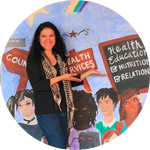Haven't backed any projects yet!
My first labnote
Hello! Just a quick update for you all. I have submitted one paper to a journal for publication. I'm currently working on a second paper and will be submitting to another journal for publication...
303 surveys as of 1/27/2017
As my timeline for recruitment ends, I continue to have young people who attend the local colleges help out with recruitment. Additionally, I've been posting to several online community boards suc...
Surveys completed as of 12/18/2016
"The importance of Facebook in the world of social media simply cannot be overstated. With more than 1 billion active monthly users, it is the most visited social network in the world..." Suse Bar...
Surveys completed as of 11/17/2016
"Youth mental health problems are on the rise, and 6 out of 10 young people with major depression do not receive ANY mental health treatment." California ranks #23. Connecticut ranks #1, Nevada ran...
100% Funded!
Thank you to all my backers for donating to my project! I'm very excited to get started in the next phase of outreach!
Surveys completed as of 10/22/2016
"Good mental health literacy in young people and their key helpers may lead to better outcomes for those with mental disorders, either by facilitating early help-seeking by young people themselves,...
Surveys completed as of 10/20/2016
Did you know that the concept of mental health literacy was developed because it was a neglected field!? Coined by Dr. Jorm from Australia, he reported that health literacy ignored mental disorder...
Surveys completed as of 10/15/2016
In the 2014 National Survey of College Counseling Centers, 94% of university counseling center directors (n=203) reported an increase of serious mental health problems, such as depression, anxiety,...
Surveys completed as of 10/11/2016
98 surveys completed! Another sighting of my dissertation flyer at Polly Ann Ice Cream in the Outer Sunset!
